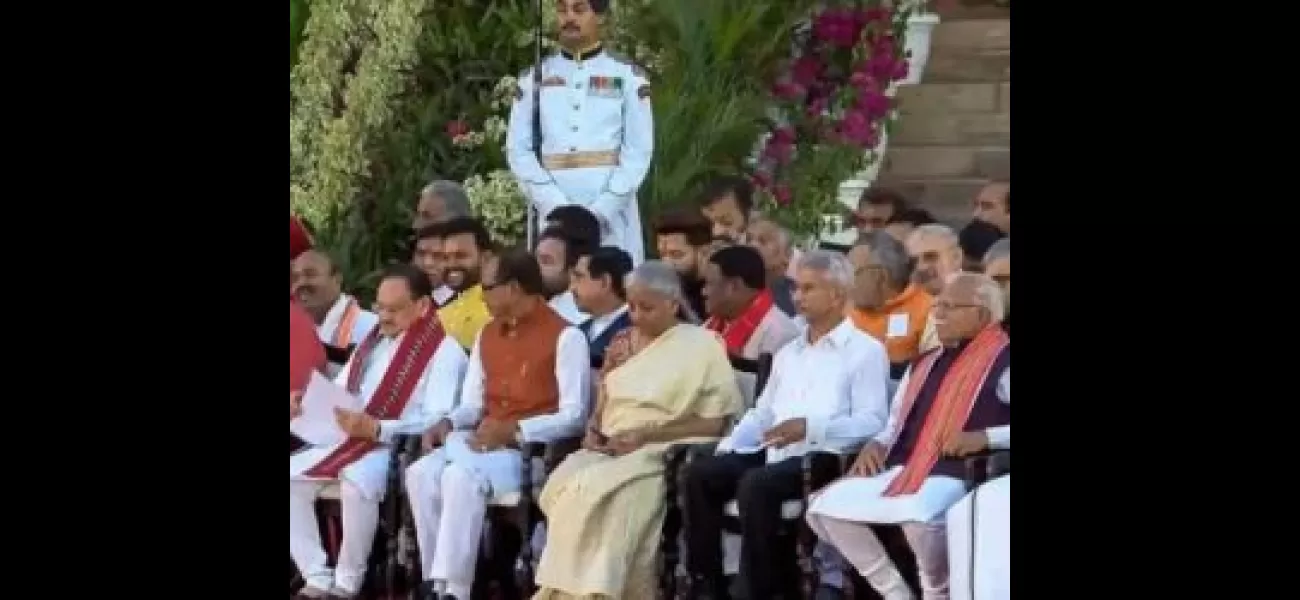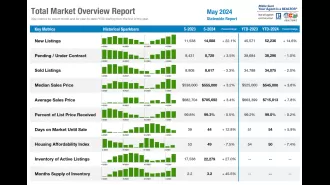Modi's government begins work as ministers take charge.
The new Indian government, led by Prime Minister Narendra Modi for a third term, began working as ministers took charge after cabinet assignments were announced.
June 11th 2024.

The newly-elected Indian government, led by Prime Minister Narendra Modi for a third consecutive term, wasted no time in getting to work on Tuesday. As cabinet ministers and ministers of state arrived at their respective offices to take charge, there was a sense of both change and continuity in the air.
After the portfolios were announced the day before and the ministers were sworn in at a grand ceremony, the corridors of power were abuzz with flowers, congratulations, and prayers. The NDA 3.0 officially took office a week after the election results showed a majority for the alliance, with 293 seats and the BJP holding 240 of them.
The transition from the previous government to the present one was seamless, with four big portfolios remaining unchanged - Amit Shah for Home, S Jaishankar for External Affairs, Nirmala Sitharaman for Finance, and Rajnath Singh for Defence. In his first address as the new External Affairs Minister, Jaishankar declared that the guiding principles of Indian foreign policy will be "Bharat First" and "Vasudhaiva Kutumbakam".
On the topic of India's relations with China, Jaishankar acknowledged that there are still some unresolved issues along the border and that efforts will be made to resolve them. He stated, "Our focus with regard to China will be on how to resolve the remaining issues."
BJP President J P Nadda took charge of the Health and Chemical and Fertilisers ministries, while other ministers also made initial statements as they assumed their new roles. Ashwini Vaishnaw, who continues to hold the key portfolios of Railways and Electronics and Information Technology, also took charge as the Information and Broadcasting Minister. He expressed the government's commitment to serving the poorest of the poor and emphasized the measures taken for the welfare of farmers, youth, and women.
As he resumed his role as Minister of Electronics and Information Technology, Vaishnaw also highlighted the government's focus on cementing India's global lead in semiconductor and electronics manufacturing and establishing the country as a technology and digital hub.
Jitendra Singh, who took office as Minister of State for Personnel, Public Grievances and Pensions, stated that the government will continue to implement good governance reforms to increase citizen-centricity and ensure ease of living for all. Prime Minister Modi himself is in charge of this ministry, and Singh praised the last decade for witnessing revolutionary governance reforms inspired by the motto of "minimum government, maximum governance".
Jyotiraditya Scindia, the new Communications Minister, recognized the key roles of the telecom sector and India Post Division on both the global and local stages. He also shared his emotional ties to the department, as he had previously worked as a junior minister in the same department about fifteen years ago.
Kiren Rijiju, who is now Minister for Parliamentary Affairs and Minority Affairs, promised to work towards ensuring a smooth functioning of Parliament and taking everyone along. He stated, "We need not pull each other down on the basis of numerical strength. People use muscle power outside Parliament, but inside the House, we should use vocal power for good debate."
Annapurna Devi, the new Minister for Women and Child Development, expressed her commitment to fulfilling Prime Minister Modi's dream of a developed Bharat. The new Culture Minister, Gajendra Singh Shekhawat, echoed her sentiments and stated that his ministry will contribute towards making this vision a reality.
Pralhad Joshi, the new Minister for Consumer Affairs, Food & Public Distribution, said his priority will be to implement the 100-day agenda of the government and strengthen the food security system. He expressed gratitude towards the Prime Minister for entrusting him with this important department that directly impacts the lives of 80 crore people.
The new Union Power Minister, Manohar Lal Khattar, met with heads of public sector undertakings and other top officials to understand the dynamics of the sector. However, he did not offer any comments to the media about his plan of action for the next 100 days.
There were also jubilant scenes as the allies of the BJP who were given ministerial berths took charge. Chirag Paswan, the two-time MP from Bihar and chief of Lok Janshakti Party, took office as the Minister for Food Processing Industries after a small religious ceremony. He emphasized the potential of the food processing sector and stated that the 100-day plan will be ready after discussions with ministry officials.
Among the five members of the BJP's allies in the Union Cabinet, JD-S' H D Kumaraswamy has been given the Heavy Industries and Steel ministries, Jitan Ram Manjhi has the Micro, Small and Medium Enterprises Ministry, and Lalan Singh has been given the Panchayati Raj, Fisheries, Animal Husbandry, and Dairying ministries. TDP's K Rammohan Naidu has been appointed as the Minister for Civil Aviation.
In his first Cabinet meeting on Sunday, Prime Minister Modi told his colleagues that most of them will continue to handle their existing responsibilities, showcasing a sense of continuity in the government's approach.
After the portfolios were announced the day before and the ministers were sworn in at a grand ceremony, the corridors of power were abuzz with flowers, congratulations, and prayers. The NDA 3.0 officially took office a week after the election results showed a majority for the alliance, with 293 seats and the BJP holding 240 of them.
The transition from the previous government to the present one was seamless, with four big portfolios remaining unchanged - Amit Shah for Home, S Jaishankar for External Affairs, Nirmala Sitharaman for Finance, and Rajnath Singh for Defence. In his first address as the new External Affairs Minister, Jaishankar declared that the guiding principles of Indian foreign policy will be "Bharat First" and "Vasudhaiva Kutumbakam".
On the topic of India's relations with China, Jaishankar acknowledged that there are still some unresolved issues along the border and that efforts will be made to resolve them. He stated, "Our focus with regard to China will be on how to resolve the remaining issues."
BJP President J P Nadda took charge of the Health and Chemical and Fertilisers ministries, while other ministers also made initial statements as they assumed their new roles. Ashwini Vaishnaw, who continues to hold the key portfolios of Railways and Electronics and Information Technology, also took charge as the Information and Broadcasting Minister. He expressed the government's commitment to serving the poorest of the poor and emphasized the measures taken for the welfare of farmers, youth, and women.
As he resumed his role as Minister of Electronics and Information Technology, Vaishnaw also highlighted the government's focus on cementing India's global lead in semiconductor and electronics manufacturing and establishing the country as a technology and digital hub.
Jitendra Singh, who took office as Minister of State for Personnel, Public Grievances and Pensions, stated that the government will continue to implement good governance reforms to increase citizen-centricity and ensure ease of living for all. Prime Minister Modi himself is in charge of this ministry, and Singh praised the last decade for witnessing revolutionary governance reforms inspired by the motto of "minimum government, maximum governance".
Jyotiraditya Scindia, the new Communications Minister, recognized the key roles of the telecom sector and India Post Division on both the global and local stages. He also shared his emotional ties to the department, as he had previously worked as a junior minister in the same department about fifteen years ago.
Kiren Rijiju, who is now Minister for Parliamentary Affairs and Minority Affairs, promised to work towards ensuring a smooth functioning of Parliament and taking everyone along. He stated, "We need not pull each other down on the basis of numerical strength. People use muscle power outside Parliament, but inside the House, we should use vocal power for good debate."
Annapurna Devi, the new Minister for Women and Child Development, expressed her commitment to fulfilling Prime Minister Modi's dream of a developed Bharat. The new Culture Minister, Gajendra Singh Shekhawat, echoed her sentiments and stated that his ministry will contribute towards making this vision a reality.
Pralhad Joshi, the new Minister for Consumer Affairs, Food & Public Distribution, said his priority will be to implement the 100-day agenda of the government and strengthen the food security system. He expressed gratitude towards the Prime Minister for entrusting him with this important department that directly impacts the lives of 80 crore people.
The new Union Power Minister, Manohar Lal Khattar, met with heads of public sector undertakings and other top officials to understand the dynamics of the sector. However, he did not offer any comments to the media about his plan of action for the next 100 days.
There were also jubilant scenes as the allies of the BJP who were given ministerial berths took charge. Chirag Paswan, the two-time MP from Bihar and chief of Lok Janshakti Party, took office as the Minister for Food Processing Industries after a small religious ceremony. He emphasized the potential of the food processing sector and stated that the 100-day plan will be ready after discussions with ministry officials.
Among the five members of the BJP's allies in the Union Cabinet, JD-S' H D Kumaraswamy has been given the Heavy Industries and Steel ministries, Jitan Ram Manjhi has the Micro, Small and Medium Enterprises Ministry, and Lalan Singh has been given the Panchayati Raj, Fisheries, Animal Husbandry, and Dairying ministries. TDP's K Rammohan Naidu has been appointed as the Minister for Civil Aviation.
In his first Cabinet meeting on Sunday, Prime Minister Modi told his colleagues that most of them will continue to handle their existing responsibilities, showcasing a sense of continuity in the government's approach.
[This article has been trending online recently and has been generated with AI. Your feed is customized.]
[Generative AI is experimental.]
0
0
Submit Comment





